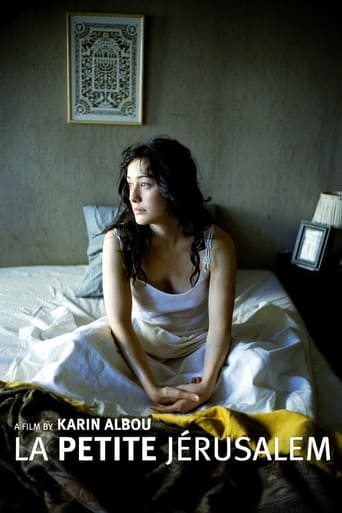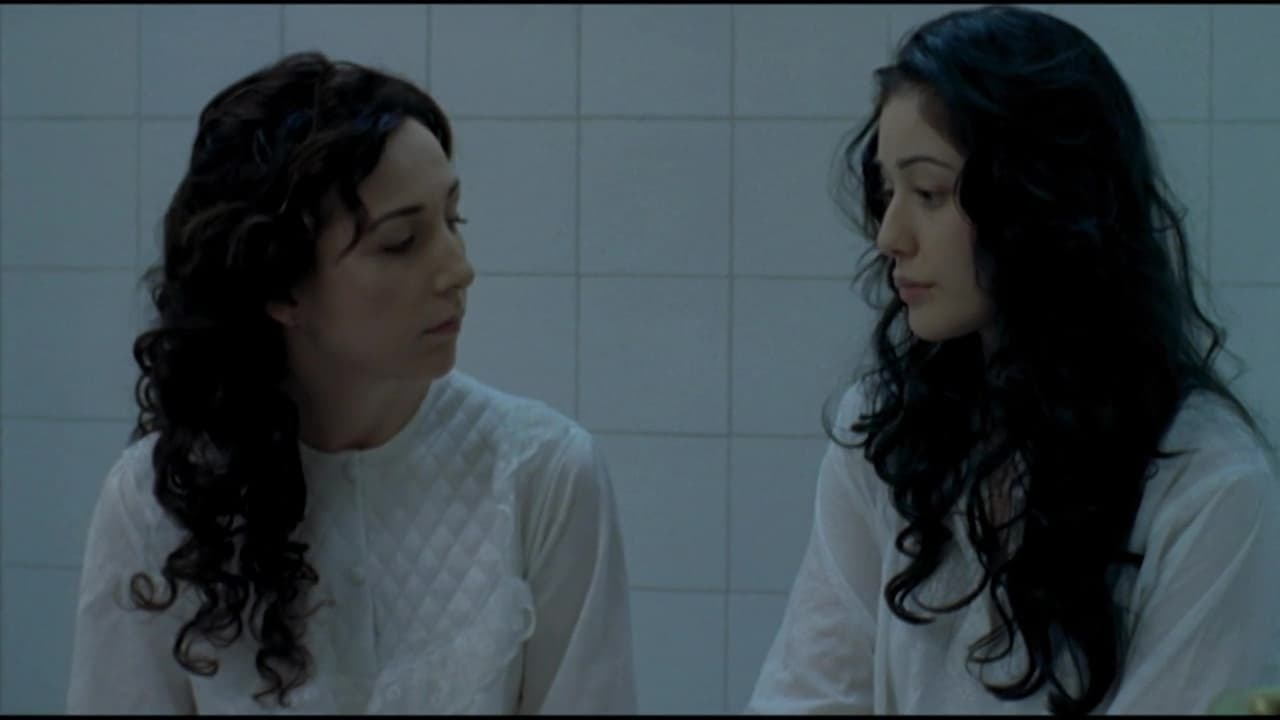runamokprods
A simple story ,beautifully shot and well acted. A girl from an close knit orthodox Jewish family in Paris falls for a mysterious, quiet Arab man. It's familiar territory, but done so sensually, and with such rich sense of detail that it feels completely fresh. A glimpse into a closed off world, where people cling to traditions in both fear and pride, leading to an almost incestuous over-involvement in each other's lives.Great use of close-up image throughout, adding texture, and intimacy, It's that rare film that gives such a strong sense of place, it's almost like you can smell the air of the locations.
R. Ignacio Litardo
This little gem, while melodramatic, lingers in memory basically by the beauty of images, music and female characters. You get inside their lives, rites, routine, family life, status of each member, machismo, religion vs. reason, sexuality, taboos one would think would have fallen in the XXI century, urban decay, how little philosophy students earn, even in the first world :) and so many other topics that would be tiresome even to read.The film is fun to watch, it's very easy to relate with the characters, from Todeschini's very believable Ariel (!) to of course Zilberstein, one of the most beautiful faces in French cinema and Fanny Valette, simply startling. Aurore Clément exudes classy intelligence, as in all her roles. In here her role is pivotal, albeit small. "Religion is not opposed to pleasure". Thus, she makes things change for good.Elsa did a classy prostitute with a hidden heart in "Tenue correcte exigée" (1997), thus showing here how big is her actoral range. The only aspect I wasn't very convinced of was Djamel, and his family. For starters, I just don't see him as a good romantic partner for spellbinding Laura. Maybe it's that she's more amenable to our western idea of beauty and success at work. He, on the contrary, seems to do nothing but stalk at her at nigh, like a serial killer. We hear he says he was a journalist, but we get to know nothing about him besides he's got a bigot family. And quite stupidly, he takes her without, seemingly, having asked before if she would be accepted. The Arabs are shown as narrow minded as the Jews, only in a more brutish manner. One of the little phrases that matter is Laura's: "What did you do back home". Everybody was "something else" (presumably, better) before coming to a Paris really off the beaten track us tourists love to watch. François Marthouret, a staple of classic French cinema, portrays a very solid philo teacher. Engaging, intelligent, and fun. You really want to enroll in a College course afterwards! I have to admit Kantism seems a tad rigid, but definitely not so asking ourselves the eternal big questions, justice/law vs liberty, how much can we attain by reason alone, what is our "duty" and so one. By the way, I am surprised a College teacher has to wipe floors and clean schools at night shifts for a living in the first of first worlds. Again, the film doesn't shy away from showing real life. But what sets it apart is the vivid portrayal of the Jewish ritual, both the male's (everybody drinking, toddling their altars, including the kids, and drinking Vodka heavily) and female's Mikva (very interesting, water as purification as usual, but with a twist). The other one I liked was the families gathering on Sunday, banging their feet and emitting shrill voices, just like it must have been in the tribes, 2000 years ago. Enlightening, how so much remains the same while only a few things have changed.Enjoy it, and take care of your loved ones! PS: Another aspect I liked was how both Djamel and Laura suffered when they had to repress their feelings, passions or just lust.
ummfatima02
I thought the movie was well done from the beginning. We center on Laura, from the opening scene breaking from the rest of the crowd to pray on her own beside the river. This could be a slight hint at the direction her faith might be taking. Separate, deep concentration, solitary. etc.. WE learn that she has decided to cast away her premonitions of sensual desires as controlling and things best kept at bay. Until we are introduced to the calm and mysterious Djamel. A scene in the locker room. when he covers her slightly bare arm, was as sensual as any sex scene any movie could produce. We see that his intentions are genuine and not harmful. Their relationship is dwindled when reality is thrown in the mix. Laura cannot deny her heritage and religion, no matter how she rebels, and Djamel cannot escape his past which is written all over him. Mathilde's comes back to haunt Laura..."We are all alone." No matter what we may believe to be truth, in the end we are all alone in the results of our decisions.
noralee
"La Petite Jerusalem (Little Jerusalem)" is a French intellectual exercise that manages to let feelings come through. Unlike Eric Rohmer's static arguments about mind vs. desire, as between two middle-aged guys in "Claire's Knee," here the clash of philosophies is demonstrated through a year in the intimate daily lives of two Orthodox Jewish sisters.While the intellectual discussions are very didactically presented through these two incredibly naive, but very intelligent, women, the very frank portrait of life in an intensely religious North African immigrant community, which debut writer/director Karin Albou comes from, is moving. The older sister, Mathilde (Elsa Zylberstein), represents the unquestioning rule follower of formal religion. She's married with four children, but has evidently never experienced nor knows anything about orgasms and she seems to have had no formal Jewish education as she just parrots lines about faith in all powerful Hashem and knows the rules of kashruth and going to the mikveh for the monthly cleansing ritual (which we see full frontally), but not much else. She is atypically isolated from the usually close women in her community who could provide her information and support. Hers seems a peasant Judaism.The rebellious younger sister, Laura (a very appealing Fanny Valette), is some sort of nonmatriculated philosophy student, but is also teaching and working as a cleaner. She follows to the letter first one than another secular philosophers' dictates, including celibacy, as rigidly as her brother-in-law head-of-the-household is apparently following the daily prayers, weekly Shabbat and seasonal rules of Judaism. Her intellectual rigidity leads her to reject the handsome Jewish medical student who comes to her for philosophical tutoring because he is too interested in the romantics and because her mother encourages the relationship with superstitious charms. The widowed mother's faith in magic is posited as a third way, along with the warm love of her children that is challenged but never wavers.Both sisters are faced with a heart breaking crisis of romantic passion in their lives that their philosophies don't seem to be able to reconcile. (Sorry, but it is beyond ludicrous that every woman in the household is mystified that the younger feels a certain stirring when a young handsome, dark-skinned Arab looks at her, and it's too bad that we learn so little about him except that he too is an intellectual who is torn about being a rebel within his family and culture.) But I saw that each just matured and learned that their views were immaturely narrow and ill-informed. They hadn't realized that for thousands of years folks have been reconciling human nature with intellect and finding a way to live with both, as gently pointed out by their mentors. Each learns to bend, while finding strength in their individual beliefs in unpredictable ways.The best part of the film is the realistic depiction of celebration of the Jewish holidays amidst multicultural life within the crowded les banlieues surrounding Paris (very comparable to neighborhoods in Brooklyn NYC) where we also saw romantic tensions in "Lila Says (Lila dit ça)" and "Games of Love and Chance (L'Esquive)." The film opens with tashlich, the symbolic discarding of sins for the new year, moves on to the celebration of the Torah in Simhat Torah and on to Purim. If this was an American family we'd see a seder and menorah lighting, but here Passover and Hanukkah are represented simply as special synagogue services. Here we also see the anti-Semitic violence that has threatened French Jews since the Intifada spilled over into Europe, which I haven't seen in films before. It is very ironic that this Tunisian Jewish family is as much refugees from North Africa as their Muslim Algerian neighbors who reject them.


 AD
AD



